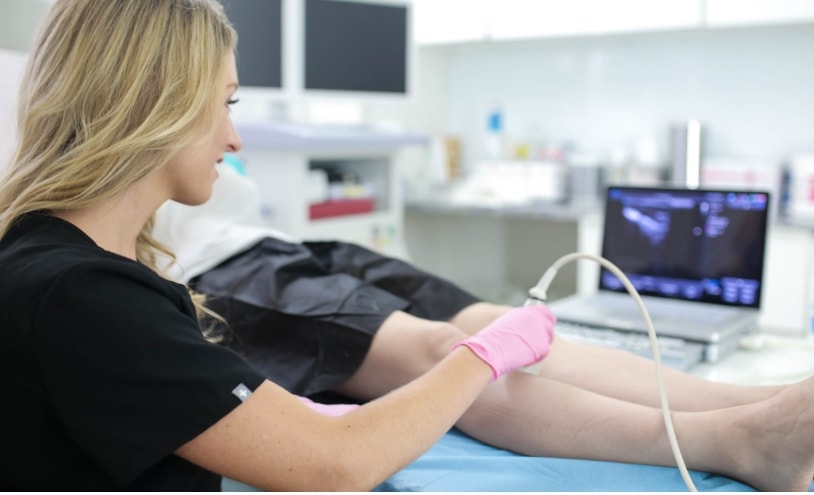Introducing Our Vein Doctor in Texas
The Spider Vein and Varicose Vein Clinic in Houston, TX, is led by an incredibly talented and compassionate vein doctor — Dr. Calvin Jung. We individually select our vein doctors from the country’s leading medical schools, residency programs, and fellowships. Dr. Jung is undoubtedly the most charismatic and reliable vein doctor in Texas, having graduated at the top of his class from the NYU School of Medicine. He ensures that all of his patients feel comfortable during the vein treatment, and he discusses all of your vein treatment options at length to help you make an informed decision.
Our vein doctors believe that all patients should have access to accurate and reliable information about vein problems. Unfortunately, the online realm is full of misinformation about spider veins and varicose vein treatments. It’s commonly assumed that spider veins are harmless cosmetic problems, whereas they’re usually symptomatic of a dangerous underlying medical condition known as chronic venous insufficiency. Furthermore, some patients assume that all varicose vein treatments are surgical procedures involving downtime, whereas they’re actually minimally invasive procedures with no downtime. These misconceptions prevent patients from seeking timely care, which causes vein disease to worsen.
This article aims to set the record straight. Our vein doctors in Texas answer the most common questions about spider veins and varicose veins. You can also schedule an appointment online for more information.

What doctor should I see for vein pain?
You should consult vein doctors for all vein-related problems, including vein pain, leg pain, leg heaviness, restless leg syndrome, frequent leg cramps, spider veins, and varicose veins. If you notice these signs and symptoms, you may have underlying chronic venous insufficiency, especially if they worsen at the end of the day or after long periods of sitting or standing still. Vein doctors diagnose and treat the root cause of your vein pain.
How do I find the right vein doctor?
You must find the right vein doctor for your spider and varicose vein treatments. Unfortunately, the barrier for entry into phlebology is pretty low, so even fairly inexperienced doctors can provide vein treatments after passing written examinations. Inexperienced vein doctors often treat spider veins as cosmetic problems, i.e., they remove the visible spider veins without addressing the underlying vein disease, increasing the risk of relapse. As such, you must find the right vein doctor for your vein treatment in Texas.
The following are some of the factors to consider when looking for vein doctors in Texas:
- Look for vein doctors with exceptional credentials and educational backgrounds.
- Look for vein doctors specializing in vascular imaging.
- Look for vein doctors with specialized training in minimally invasive vein treatments.
- Look for vein doctors who accept all major insurance plans, including Medicare.
- Look for vein doctors who provide free insurance verification.
- Look for vein doctors with unanimous 5-star ratings and reviews from patients.
Do dermatologists treat varicose veins?
Dermatology is the branch of medicine concerned with the diagnosis and treatment of skin problems. While dermatologists often provide spider vein and varicose vein treatments, their solutions usually focus on cosmetic relief — they treat spider veins and varicose veins without addressing the root cause. As such, your spider veins and varicose veins may go away for a short period, but they will inevitably return. You should only seek spider vein and varicose vein treatments from phlebologists or dermatologists with additional training in the diagnosis and treatment of chronic venous insufficiency.
What is the root cause of varicose veins?
Chronic venous insufficiency is the primary root cause of most vein problems, including spider veins and varicose veins. Venous insufficiency is a circulatory disorder wherein the vein valves collapse. The vein valves are like one-way doors that facilitate smooth one-way blood circulation to the heart, often against the force of gravity. When your vein valves collapse, gravity forces blood to flow backward and accumulate in the leg veins. The continued accumulation of blood in leg veins is directly responsible for the formation of spider veins and varicose veins.
Can varicose veins go away?
No, varicose veins cannot go away on their own because they’re caused by damaged vein valves and blood accumulation in leg veins. You can minimize the symptoms of varicose veins with some lifestyle changes, such as wearing compression stockings, exercising, and elevating your legs above your heart’s level while sitting. However, these techniques will only provide minor and temporary relief from the worst symptoms of vein disease. The only way to remove varicose veins is through minimally invasive varicose vein treatments.
Is walking good for varicose veins?
Walking is good for varicose veins and vascular health in general. It improves blood circulation and pushes the accumulated blood towards your heart, thus alleviating the pressure of accumulated blood in leg veins. However, the relief is mild and temporary. You must undergo minimally invasive varicose vein treatments for long-lasting relief.
How can I stop varicose veins from getting worse?
If you want to prevent varicose veins from worsening, you must incorporate lifestyle changes that facilitate blood circulation towards the heart. However, all lifestyle changes and home remedies are temporary — you will eventually have to undergo minimally invasive spider vein and varicose vein treatments.
The following are some tips to prevent varicose veins from worsening:
- Wear compression stockings regularly
- Engage in cardiovascular exercises that activate your calf muscles — running, swimming, cycling, and yoga
- Elevate your legs above your heart’s level while sitting down
- If you have a desk job, take short walking breaks after every 30 minutes
If you want permanent relief from varicose veins and spider veins, you must contact your vein doctors in Texas. The vein doctor will examine your leg veins, run diagnostic tests, determine if you have chronic venous insufficiency, and curate a personalized vein treatment plan for you.

